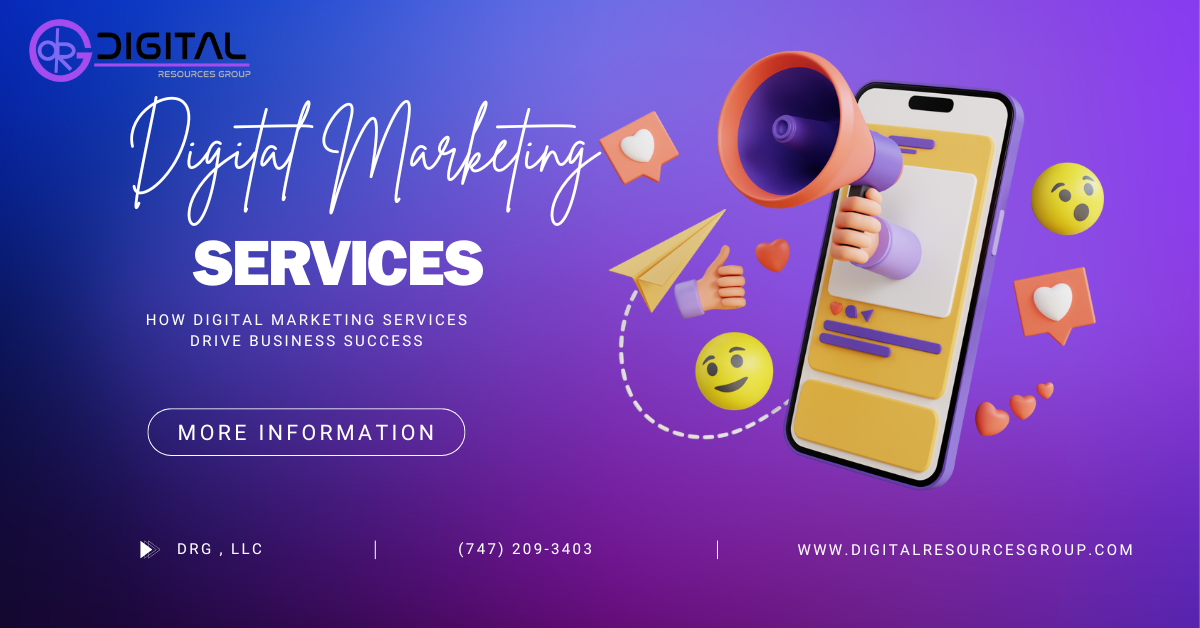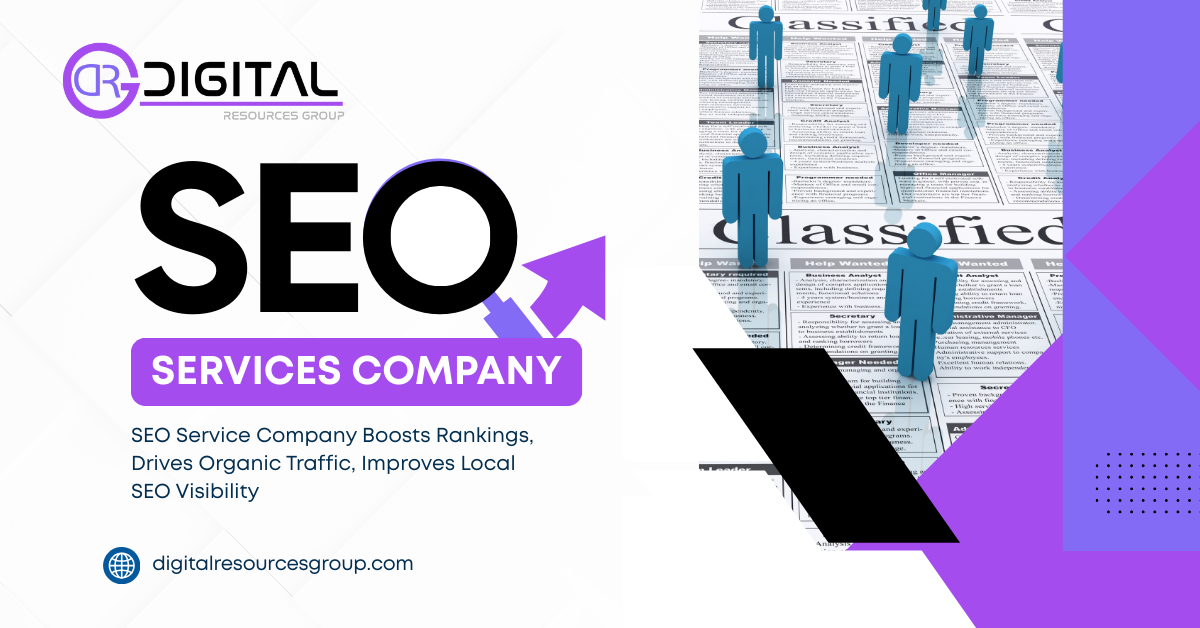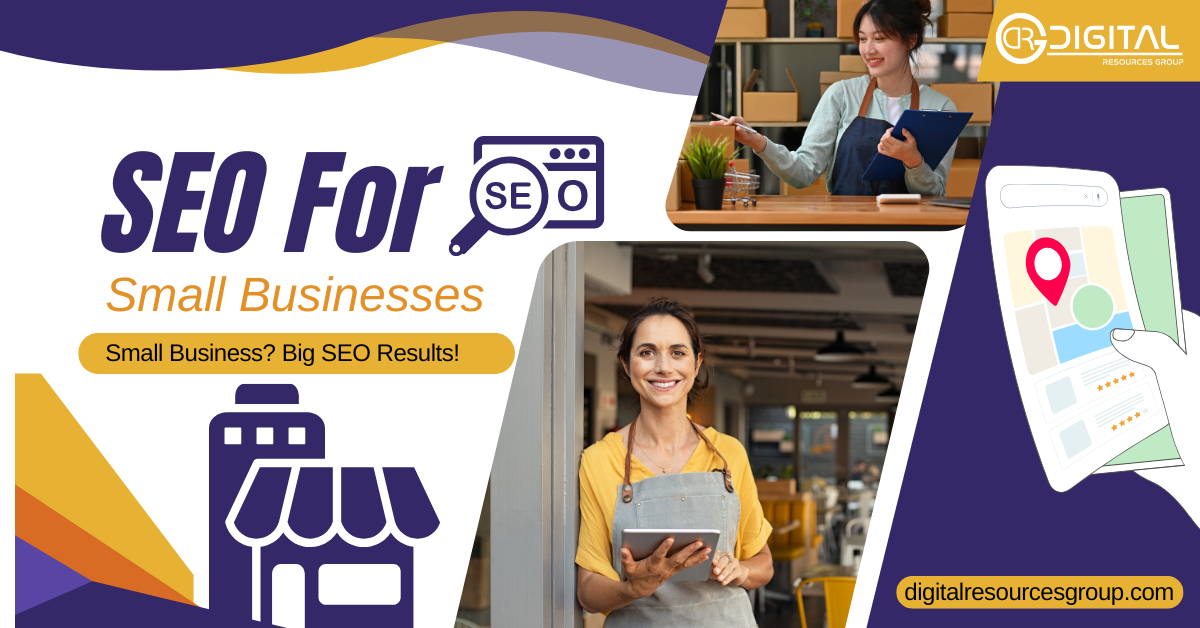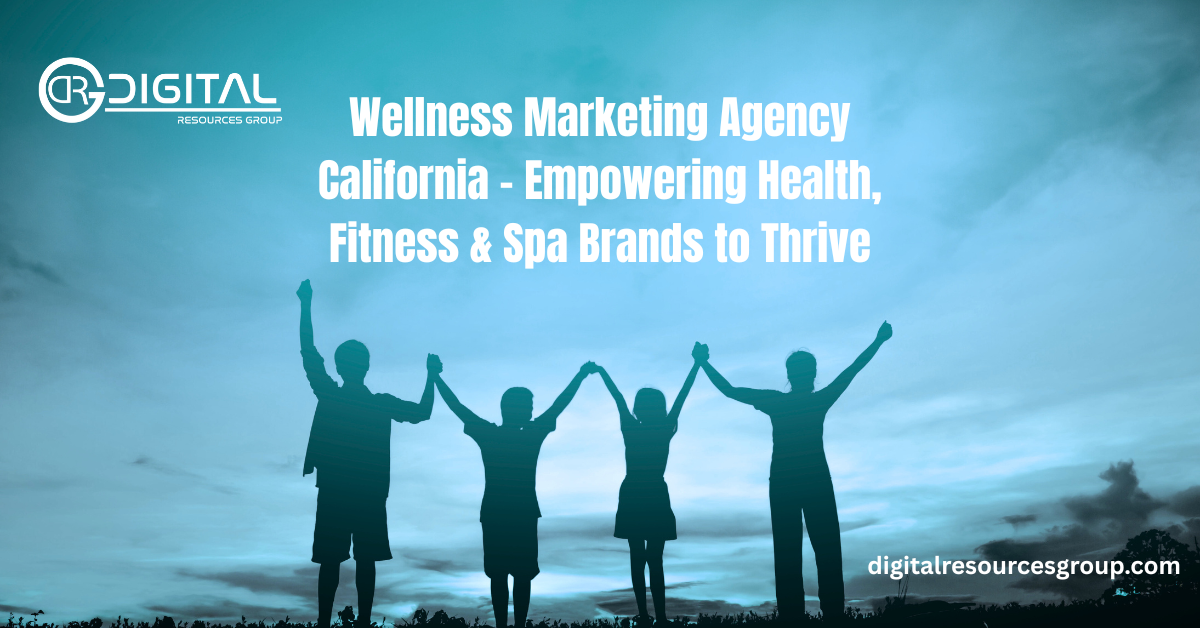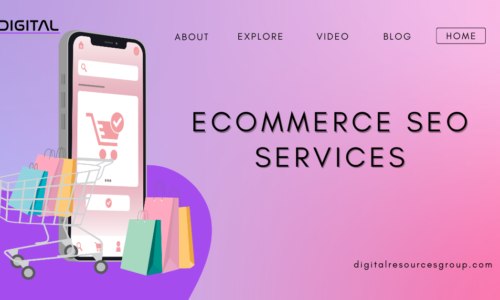- Digital Resources Group
- Digital marketing services, digital marketing solutions, Social Media Optimization
- 0 Comments
- 758 Views
Digital Resources Group specializes in leveraging digital marketing services to fuel business success. As a leading provider of comprehensive digital marketing solutions, our focus is on empowering businesses to achieve their goals through strategic online presence management. Our expertise spans various aspects of digital marketing, ensuring that our clients receive tailored strategies that drive measurable results. We will delve into how digital marketing services play a pivotal role in enhancing business outcomes and why they are essential for staying competitive in the modern marketplace.
Understanding Digital Marketing Services
Definition and Scope
Digital marketing services encompass a broad range of strategies and techniques designed to promote a business or brand through digital channels. These services include but are not limited to, search engine optimization (SEO), pay-per-click (PPC) advertising, content marketing, social media marketing, and email marketing. Each component plays a critical role in establishing an online presence, attracting potential customers, and fostering engagement.
In essence, digital marketing involves utilizing online platforms and technologies to reach and interact with a target audience. By harnessing the power of the internet, businesses can connect with consumers on a global scale, providing opportunities for growth and expansion that traditional marketing methods may not offer. Digital marketing services are thus integral to any comprehensive marketing strategy, enabling businesses to stay relevant and competitive.
Key Components
The key components of digital marketing services are designed to work synergistically to achieve optimal results. These components include SEO, which improves a website’s visibility in search engine results; PPC advertising, which drives targeted traffic through paid ads; and content marketing, which engages audiences with valuable information. Additionally, social media marketing and email marketing are essential for building relationships and driving conversions.
Each component has its own set of techniques and best practices that contribute to a holistic digital marketing strategy. For instance, SEO focuses on optimizing website content and structure to rank higher in search engines, while PPC advertising targets specific keywords to attract potential customers. By integrating these components, businesses can create a cohesive and effective digital marketing approach that maximizes their online presence and drives success.
The Impact of Digital Marketing on Business Success
Enhancing Brand Visibility
Digital marketing services significantly enhance brand visibility by leveraging various online channels. Through SEO, businesses can improve their search engine rankings, making it easier for potential customers to find them. Additionally, PPC advertising can boost visibility through targeted ads that appear in search engine results or on other websites. By consistently appearing in front of the target audience, businesses can build brand recognition and establish themselves as leaders in their industry.
Moreover, content marketing plays a crucial role in enhancing brand visibility by providing valuable and relevant information that resonates with the audience. Engaging content, when shared across social media platforms and other digital channels, increases brand exposure and attracts new customers. By focusing on creating high-quality content and optimizing it for search engines, businesses can significantly enhance their online presence and drive success.
Driving Targeted Traffic
One of the primary benefits of digital marketing services is their ability to drive targeted traffic to a business’s website. SEO and PPC advertising are particularly effective in attracting visitors who are actively searching for products or services related to the business. By targeting specific keywords and demographics, businesses can ensure that their marketing efforts reach the right audience, resulting in higher conversion rates and increased sales.
In addition, social media marketing and email marketing contribute to driving targeted traffic by engaging with potential customers through personalized messages and promotions. Social media platforms allow businesses to reach users based on their interests and behaviors, while email marketing enables direct communication with subscribers who have expressed interest in the brand. By leveraging these strategies, businesses can attract a highly targeted audience and drive meaningful interactions.
Effective Strategies in Digital Marketing
Search Engine Optimization (SEO)
Search Engine Optimization (SEO) is a fundamental digital marketing strategy that focuses on improving a website’s visibility in search engine results. By optimizing various elements of a website, such as keywords, meta tags, and content, businesses can increase their chances of ranking higher in search engine results pages (SERPs). This, in turn, drives organic traffic to the website and enhances its credibility.
Effective SEO involves both on-page and off-page optimization techniques. On-page SEO includes optimizing content, meta descriptions, and internal linking, while off-page SEO focuses on building backlinks from reputable websites. By implementing a comprehensive SEO strategy, businesses can improve their search engine rankings, attract more visitors, and ultimately achieve greater success.
Pay-Per-Click (PPC) Advertising
Pay-Per-Click (PPC) advertising is a powerful digital marketing strategy that involves placing ads on search engines or other websites and paying only when a user clicks on the ad. PPC campaigns allow businesses to target specific keywords and demographics, ensuring that their ads reach a highly relevant audience. This form of advertising offers immediate results and can be highly effective in driving traffic and generating leads.
Successful PPC advertising requires careful planning and execution. Businesses must conduct keyword research to identify the most relevant terms to target, create compelling ad copy, and continuously monitor and adjust their campaigns to optimize performance. By leveraging PPC advertising, businesses can achieve rapid visibility, attract targeted traffic, and drive conversions.
Measuring Success in Digital Marketing
Key Performance Indicators (KPIs)
Measuring success in digital marketing involves tracking key performance indicators (KPIs) to assess the effectiveness of various strategies. KPIs are metrics that provide insights into how well a digital marketing campaign is performing and whether it is achieving its objectives. Common KPIs include website traffic, conversion rates, click-through rates (CTR), and return on investment (ROI).
By analyzing these metrics, businesses can gain valuable insights into the effectiveness of their digital marketing efforts. For example, a high CTR indicates that ads are resonating with the target audience, while a high conversion rate suggests that visitors are taking desired actions on the website. Monitoring KPIs allows businesses to make data-driven decisions, optimize their strategies, and drive continued success.
Analytics Tools and Techniques
To effectively measure success, businesses must utilize analytics tools and techniques to track and analyze data. Tools such as Google Analytics provide comprehensive insights into website performance, user behavior, and campaign effectiveness. By leveraging these tools, businesses can gain a deeper understanding of their audience, identify trends, and make informed decisions to enhance their digital marketing strategies.
Analytics techniques, such as A/B testing and funnel analysis, help businesses optimize their campaigns by testing different variations and analyzing user behavior at each stage of the conversion process. By continuously monitoring and adjusting their strategies based on data, businesses can achieve better results and drive sustained growth.
The Role of Content Marketing
Creating Engaging Content
Content marketing plays a vital role in driving business success by providing valuable and engaging content to the target audience. High-quality content, whether in the form of blog posts, articles, videos, or infographics, helps businesses establish themselves as thought leaders and build trust with their audience. Engaging content not only attracts visitors but also encourages them to interact with the brand and share the content with others.
To create engaging content, businesses should focus on understanding their audience’s needs and preferences. By addressing relevant topics, providing useful information, and presenting it in an engaging format, businesses can capture the attention of their target audience and drive meaningful interactions. Consistent and high-quality content helps build brand authority and fosters long-term relationships with customers.
Content Distribution and Promotion
Creating high-quality content is only part of the equation; effective content distribution and promotion are equally important for driving success. Content distribution involves sharing content across various channels. Such as social media, email newsletters, and industry forums, to reach a wider audience. Promotion strategies, such as paid advertising and influencer partnerships, can further enhance content visibility and drive traffic.
By developing a well-rounded content distribution and promotion plan, businesses can maximize the reach and impact of their content. Utilizing multiple channels and leveraging promotional tactics ensures that content reaches the intended audience and generates the desired results. Effective distribution and promotion are essential for achieving content marketing goals and driving business success.
Social Media Marketing
Building a Social Media Strategy
Social media marketing is a key component of digital marketing that involves creating and implementing a strategy to engage with users on social media platforms. A well-defined social media strategy outlines goals, target audience, content themes, and engagement tactics. By setting clear objectives and planning content accordingly, businesses can effectively leverage social media to build brand awareness and foster customer relationships.
Building a social media strategy involves understanding the target audience’s preferences and behaviors on different platforms. Businesses should select the appropriate social media channels, develop engaging content. And establish a consistent posting schedule. By aligning social media efforts with overall business goals, businesses can drive meaningful interactions and achieve success in the digital landscape.
Engaging with Your Audience
Engaging with the audience is a crucial aspect of social media marketing. Effective engagement involves responding to comments, messages, and mentions, as well as actively participating in conversations related to the brand. By fostering a two-way dialogue, businesses can build stronger relationships with their audience and enhance brand loyalty.
Social media platforms provide opportunities for businesses to connect with their audience on a personal level. By sharing relevant content, asking questions, and encouraging user-generated content. Businesses can create a sense of community and drive engagement. Active and genuine interactions help build trust and credibility, contributing to overall business success.
Email Marketing
Developing Effective Email Campaigns
Email marketing remains a powerful digital marketing strategy for reaching and engaging with customers. Developing effective email campaigns involves creating targeted and personalized messages that resonate with the audience. Successful email campaigns include compelling subject lines, valuable content, and clear calls to action.
To develop effective email campaigns, businesses should segment their email list based on factors such as demographics, interests, and past interactions. By tailoring content to specific segments, businesses can increase the relevance of their emails and drive higher engagement. Monitoring email performance metrics, such as open rates and click-through rates, allows businesses to optimize their campaigns and achieve better results.
Personalization and Automation
Personalization and automation are key elements of successful email marketing. While automation refers to sending automated emails based on predefined triggers or schedules. By combining these approaches, businesses can deliver timely and relevant messages that enhance the customer experience.
Automation tools allow businesses to set up workflows for tasks such as welcome emails, abandoned cart reminders, and post-purchase follow-ups. Personalized and automated emails help streamline communication, nurture leads, and drive conversions. By leveraging these techniques, businesses can efficiently manage their email marketing efforts and achieve greater success.
Conclusion
Digital marketing services are essential for driving business success in the digital age. From enhancing brand visibility to driving targeted traffic and measuring performance. Digital marketing strategies play a critical role in achieving business objectives. By leveraging the expertise of Digital Resources Group, businesses can harness the power of digital marketing to unlock new opportunities and achieve their goals.
Incorporating effective strategies, such as SEO, PPC advertising, content marketing, social media marketing, and email marketing, businesses can create a comprehensive digital marketing plan that delivers measurable results. By continuously monitoring and optimizing their efforts, businesses can stay ahead of the competition and drive sustained growth.
FAQs
1. What is digital marketing?
Digital marketing refers to the use of online channels and techniques to promote a business or brand. It includes strategies such as SEO, PPC advertising, content marketing, social media marketing, and email marketing to reach and engage with the target audience.
2. How does SEO impact a business?
SEO improves a website’s visibility in search engine results, driving organic traffic and increasing brand credibility. By optimizing website content and structure, businesses can achieve higher search engine rankings and attract more visitors.
3. What is PPC advertising?
PPC advertising involves placing ads on search engines or websites and paying only when a user clicks on the ad. It allows businesses to target specific keywords and demographics, driving targeted traffic and generating leads.
4. Why is content marketing important?
Content marketing provides valuable and engaging information to the target audience, helping businesses build brand authority and trust. High-quality content attracts visitors, encourages interactions, and drives conversions.
5. How can businesses measure the success of their digital marketing efforts?
Businesses can measure success by tracking key performance indicators (KPIs) such as website traffic, conversion rates, and ROI. Analytics tools and techniques, such as A/B testing and funnel analysis, help businesses assess performance and optimize their strategies.

